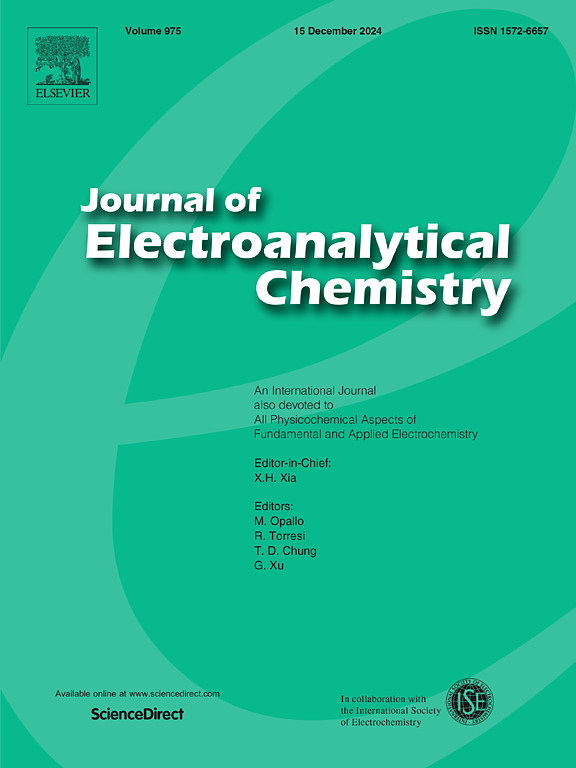泡沫镍上水热合成的无粘结剂 ZnS/CdS 作为前景广阔的混合超级电容器电极材料
IF 4.1
3区 化学
Q1 CHEMISTRY, ANALYTICAL
引用次数: 0
摘要
通过水热法可在泡沫镍上直接合成金属硫化物(MS)的二元复合材料,形成雪花状的纳米圈,适用于混合超级电容器(HSC)。本文采用简单的水热法在泡沫镍上直接生长出 ZnS/CdS 二元复合材料。系统研究了该复合材料的结构特征、形态特征和电化学性能。特别是,在 1-10 A/g 的条件下,复合材料获得了 739-325 F/g 的最高电容和良好的速率性能。此外,无粘合剂 ZnS/CdS/NF 复合材料通过将电压扩展到 1.8 V,在 42 Wh/kg 能量密度下实现了 5030 W/kg 的高功率,并具有良好的耐用性。有趣的是,经过 6500 次循环后,ZnS/CdS/NF||AC HSC 的保持率达到 92.84%,这表明其具有很高的性能稳定性。这些成果揭示了将全金属硫化物用于下一代储能设备的广阔前景。本文章由计算机程序翻译,如有差异,请以英文原文为准。
Hydrothermally synthesized binder-less ZnS/CdS on nickel foam as promising hybrid supercapacitor electrode materials
A binary composite of metal sulfides (MS) is directly synthesized on nickel foam through hydrothermal process, resulting in snow like nanosphere suitable for hybrid supercapacitors (HSCs). Herein, a ZnS/CdS binary composite has been grown directly on nickel foam using a simple hydrothermal method. The structural features, morphological characteristics and electrochemical performance of the composite are systematically investigated. Especially, the highest capacitance of 739–325 F/g at 1–10 A/g was attained with good rate performance. Moreover, a binder-less ZnS/CdS/NF composite achieved a high power of 5030 W/kg at 42 Wh/kg energy density by realizing an expanded voltage to 1.8 V with decent durability. Interestingly, a 92.84 % retention was noticed after 6500 cycles, which indicates high performance stability of the ZnS/CdS/NF||AC HSC. These outcomes reveal the promising prospect of all-metal sulfide utilization for next-generation energy storage devices.
求助全文
通过发布文献求助,成功后即可免费获取论文全文。
去求助
来源期刊
CiteScore
7.80
自引率
6.70%
发文量
912
审稿时长
2.4 months
期刊介绍:
The Journal of Electroanalytical Chemistry is the foremost international journal devoted to the interdisciplinary subject of electrochemistry in all its aspects, theoretical as well as applied.
Electrochemistry is a wide ranging area that is in a state of continuous evolution. Rather than compiling a long list of topics covered by the Journal, the editors would like to draw particular attention to the key issues of novelty, topicality and quality. Papers should present new and interesting electrochemical science in a way that is accessible to the reader. The presentation and discussion should be at a level that is consistent with the international status of the Journal. Reports describing the application of well-established techniques to problems that are essentially technical will not be accepted. Similarly, papers that report observations but fail to provide adequate interpretation will be rejected by the Editors. Papers dealing with technical electrochemistry should be submitted to other specialist journals unless the authors can show that their work provides substantially new insights into electrochemical processes.

 求助内容:
求助内容: 应助结果提醒方式:
应助结果提醒方式:


